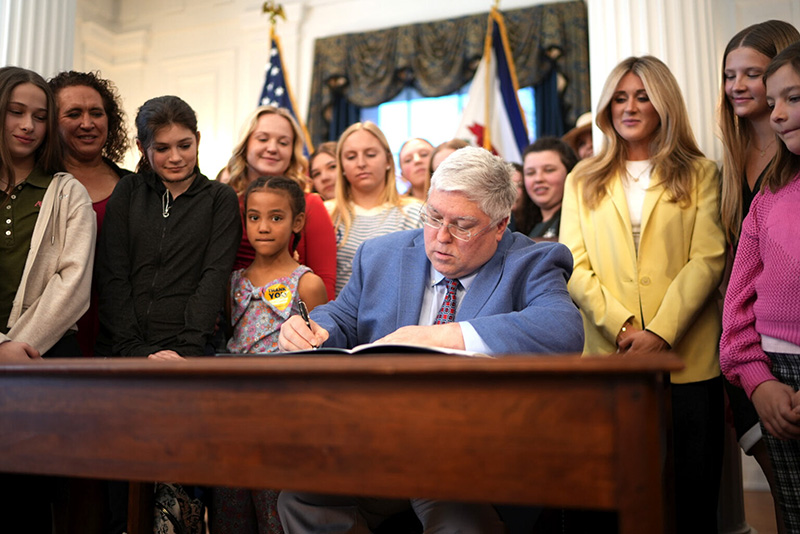Iowa Supreme Court Finds State Discriminated Against Trans Employee
Jesse Vroegh was denied insurance coverage for medically necessary care and barred from the men's restrooms and locker room at work.

The Iowa Supreme Court has ruled that the state’s Department of Corrections discriminated against Jesse Vroegh, a former DOC nurse, when it denied him insurance coverage for gender-affirming surgery and barred him from using the men’s restrooms and locker room at work.
Vroegh, a nurse at the Iowa Correctional Institute for Women, in Mitchellville, Iowa, sued the Department of Corrections for discrimination after his supervisors denied him access to men’s facilities after he transitioned in 2016, claiming that allowing him into male-only spaces would be “too controversial.”
Vroegh was forced to use a unisex private restroom to dress and store his belongings, and, because it lacked a shower, was barred from using shower facilities before or after his shift.
Vroegh also claimed he was denied insurance coverage for medically necessary transition-related surgery, even though cisgender employees who need procedures like mastectomies can have them covered by their state employee insurance plan.
The state has since started providing this coverage for employees, in compliance with state and federal nondiscrimination laws.
In 2016, Vroegh filed a complaint with the Iowa Civil Rights Commission alleging that he had been discriminated against. In March 2017, the commission determined there was a “reasonable possibility” that it would later find sufficient evidence supporting Vroegh’s claims of discrimination.
Vroegh later filed suit in Polk County court, claiming that the Department of Corrections discriminated against him based on his gender identity, in violation of the Iowa Civil Rights Act.
Vroegh’s case was the first jury lawsuit brought under the Iowa Civil Rights Act since it was amended in 2007 to include protections for gender identity.
In February 2019, an Iowa jury found that the Department of Corrections had discriminated against Vroegh on the basis of sex and gender identity through its actions, and awarded him $120,000 in damages. The state later appealed the jury’s verdict to the Iowa Supreme Court, which upheld the jury’s verdict on Friday.
“This is a historic victory for civil rights in Iowa, because it makes real the promise of nondiscrimination protections in employment that our legislature put in place for transgender Iowans in 2007,” Rita Bettis Austen, legal director for the ACLU of Iowa, said in a statement. “Despite those longstanding protections, Mr. Vroegh’s employer, the State of Iowa, repeatedly denied his requests to use the men’s restrooms and locker rooms consistent with his gender identity at work, and the state’s employee health insurance program excluded coverage for the medically necessary gender-affirming surgery for transgender employees, even though it covered the same procedures so long as they were not to treat gender dysphoria.
“The state should have been a model for other employers in its treatment of a transgender worker, but instead blatantly discriminated against Jesse, who only ever asked to be treated the same as his coworkers,” Bettis Austen added. “We are so grateful to Jesse Vroegh, our inspiring and brave client, for taking on this first-of-its kind legal battle in our state and doing so much to build support and change hearts and minds for those who will come after him. We are also grateful to the Iowa jurors who saw through the state’s discriminatory arguments and rendered justice for Jesse, and to the Iowa Supreme Court for upholding their verdict.”
Melissa Hasso, an attorney with the Des Moines-based Sheridan & Hasso Law Firm — which represented Vroegh along with the American Civil Liberties Union and the ACLU of Iowa — called the Iowa Supreme Court’s ruling an “important step forward for our transgender friends, relatives, and co-workers in their efforts to live productive and rewarding lives.”
“It has truly been an honor to represent Jesse and to work with my bright and dedicated colleagues at ACLU Iowa throughout this long battle. Most of all, we are all very proud of our fellow Iowans who sat on the jury, heard the evidence, and reached a decision that promotes equality and justice over discrimination and hatred,” Hasso said in a statement.
Vroegh expressed satisfaction with the high court’s verdict.
“This day has been a long time coming. I am so happy that my state supreme court has recognized that transgender people like me should be treated just the same as everyone else when it comes to medical care — that if a doctor says I should receive medical treatment, I get the treatment,” he said.
“I am doing this so that other transgender people do not have to go through what I have,” Vroegh added. “I am a nurse and I see on a regular basis how important it is for people to be treated equally when receiving medical care. It’s important for all people to be treated with dignity and respect.”
Support Metro Weekly’s Journalism
These are challenging times for news organizations. And yet it’s crucial we stay active and provide vital resources and information to both our local readers and the world. So won’t you please take a moment and consider supporting Metro Weekly with a membership? For as little as $5 a month, you can help ensure Metro Weekly magazine and MetroWeekly.com remain free, viable resources as we provide the best, most diverse, culturally-resonant LGBTQ coverage in both the D.C. region and around the world. Memberships come with exclusive perks and discounts, your own personal digital delivery of each week’s magazine (and an archive), access to our Member's Lounge when it launches this fall, and exclusive members-only items like Metro Weekly Membership Mugs and Tote Bags! Check out all our membership levels here and please join us today!


























You must be logged in to post a comment.